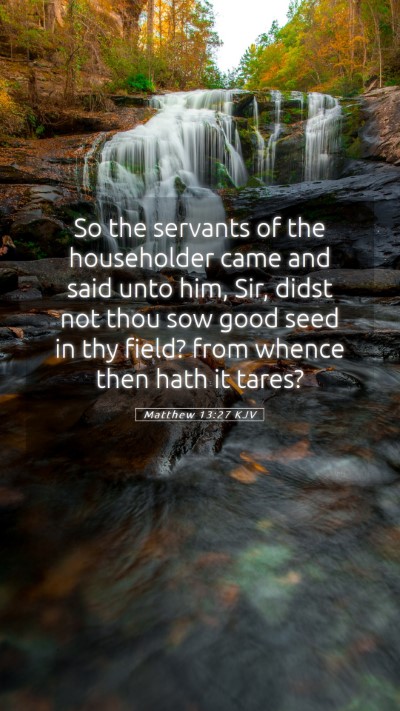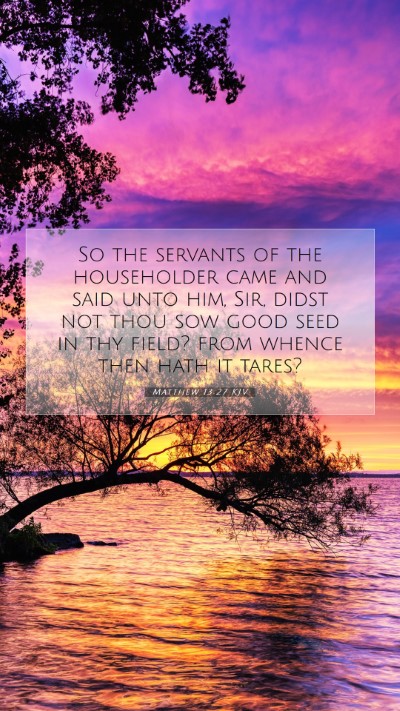Understanding Matthew 13:27
Verse: "So the servants of the householder came and said unto him, Sir, didst not thou sow good seed in thy field? from whence then hath it tares?" - Matthew 13:27 (KJV)
Overview
This verse is part of the Parable of the Wheat and the Tares, where Jesus uses agricultural imagery to convey profound spiritual truths. The servants, upon noticing the tares (weeds) among the wheat, approach the householder (owner) with a question that reflects confusion and concern about the integrity of the field's harvest.
Bible Verse Meanings
In understanding this Bible verse, we look at several elements derived from public domain commentaries:
- The Householder: Represents God, the ultimate sower of good seed (believers) in the world.
- The Good Seed: Symbolizes the children of the kingdom, those who accept God's Word and live according to His commandments.
- The Tares: Represent the children of the wicked one, those influenced by evil and sinfulness in the world.
Bible Verse Interpretations
According to Matthew Henry, this verse indicates that despite God's provision of good seed, the enemy (Satan) plants tares, causing conflict within the community of believers. Adam Clarke emphasizes that this reflects the troubling reality of evil existing alongside good until the time of judgment.
Biblical Exegesis
In exegesis, one understands that the questions posed by the servants highlight a key theological issue: the presence of evil in a world created good by God. This duality presents both a challenge to faith and a call to vigilance among believers.
Scripture Analysis
Through this analysis, we see the importance of distinguishing between true believers and impostors. This parable teaches patience and the assurance that in the end, God will bring about justice and separation of the righteous from the wicked.
Application of the Verse
The verse leads us to consider how we respond to the presence of evil around us. It calls for strength in faith and encourages discernment within the body of Christ as we strive to uphold truth and righteousness.
Bible Study Insights
For those engaging in Bible study groups or online Bible study, this verse can serve as a profound lesson on the nature of good and evil, and the importance of maintaining spiritual vigilance. Consider the following study insights:
- Historical Context: Understanding the agricultural society of the time helps relate better to the parable's message.
- Character Analysis: Reflection on the roles of the householder and the servants provides insight into divine human interaction.
- Practical Application: How can we apply this understanding to our daily lives amidst distractions and opposition?
Related Bible Cross References
- Matthew 13:24-30: The full parable of the wheat and the tares.
- Galatians 6:7: "Be not deceived; God is not mocked: for whatsoever a man soweth, that shall he also reap."
- John 16:33: Jesus informs His disciples that there will be tribulation in the world, but they should take heart as He has overcome the world.
Conclusion
Matthew 13:27 serves a vital role in understanding the coexistence of good and evil in the world. By examining this verse through various lenses—from historical context to practical application—we gain deeper Bible verse understanding and enrich our Bible study insights. This promotes richer discussions in Bible study groups and enhances our personal Bible study lessons.
In conclusion, the question the servants ask encourages a reflective heart, prompting believers to seek clarity and reassurance in times of spiritual confusion. By relying on Scripture and engaging in diligent study, one can uncover the profound meanings within such passages and apply them effectively in daily life.


